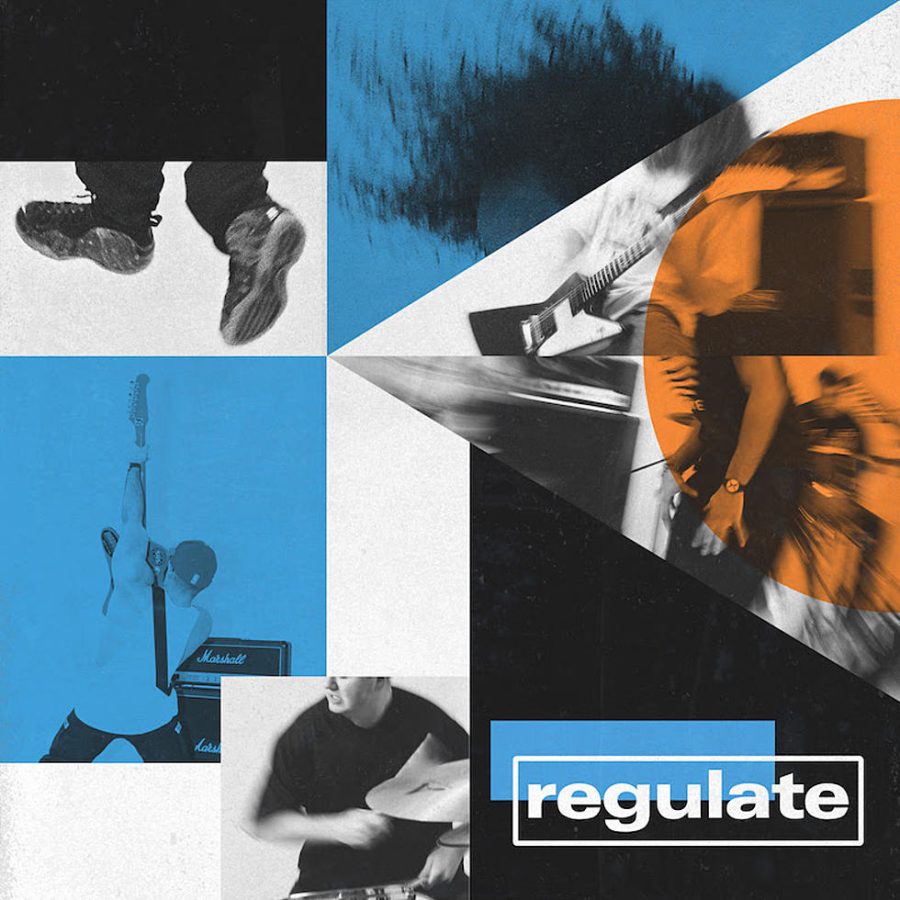Album Review | Regulate by Regulate
November 18, 2022
American hardcore is having a special moment right now. From Turnstile playing late night shows to Knocked Loose touring stadiums with $uicideboy$, extreme music is occupying a place in the popular consciousness that it hasn’t since the explosion of nu-metal in the ‘90s. With the current flood of hardcore bands releasing music today, it can be easy to let some projects pass you by.
Do not let Regulate pass you by.
Bursting at the seams with reckless energy, this album instantly rivals both classic and contemporary works in the genre and beyond. With the 10 songs constituting the 25-minute Regulate, the band has crafted a masterwork of joy, pride and ferocity. Nearly every kind of archetypal hardcore song is present on this project: celebrations of live music, anti-cop beatdowns, location-based pride and searing indictments of oppression in America.
The album opens with “In The Moment,” a song whose chorus is as catchy as its breakdown is mean. Lyrically the track is a joyous ode to live music and the hardcore scene as a whole. The art that is hardcore is meant to be seen together live, celebrated with a community.
“We touch experience you can’t fake.”
The breakdown callout is sung in Columbian by vocalist Sebastian Paba.
“Oiga mire vea.”
The phrase, often used as an exclamation to get someone’s attention, can be roughly translated as “To hear.” Paba is pleading with the audience to simply hear the music. In a live setting the crowd is likely to both hear the music and physically feel it, as the palm muted breakdown that follows lends itself perfectly to ruthless crowd killing.
The hummable melodies of “In The Moment” lead way into the first of the album’s two furious indictments of the injustice of law enforcement, “The Crime.” A slamming bass riff builds with the drums to create an up-tempo flurry that serves as the perfect frame for Paba’s lyrics about murders committed by police — lyrics that can only be done justice by hearing their delivery. He cites several cases in quick succession but notably omits all names, exemplifying how these killings are so frequent and normalized that names of victims become lost in the shuffle.
“The crime is a hoodie in winter /
The crime is failure to signal /
The crime is being in your own home.”
Trayvon Martin. Patrick Lyoya. Breonna Taylor.
“Every time I turn on the news /
I see another brother, sister dead.”
These murders fade so quickly from the popular consciousness because more are committed every day. This pain is spun into longing on the next track, “Why Can’t We?” The quick-paced guitar strumming provokes movement in whoever listens. The speed is built while Paba screams about sincerity and its lack thereof in the world today. Hate does not have to consume us. We are not weak if we express love. We don’t have to be like anyone but ourselves. These themes of identity and longing for freedom from social judgment fill the bars of this track.
“Why can’t we show love? /
Why can’t we say sorry? /
Why can’t we try? /
Why can’t we be okay with not being right?”
This track, as well as its outro, teaches us that Regulate is not a one-trick pony. The ending sample, which connects to the themes of the previous track, leads us into a song about pride in one’s identity: “Hair.”
Sonically, this song is a standout on the album. It features Paba’s clean vocals, which are some of the best in all of contemporary extreme music. There are no beatdown riffs or any other musical signifers declaring that this is a hardcore song. A gentle palm muted riff reminiscent of ‘80s pop plays over a cowbell of all things. The unstoppable groove of this song houses lyrics of self, with Paba expressing that he used to draw lines between who he was and who he showed the world. He spins these lyrics with lines about his hair, and these two ideas coalesce into one theme. His hair is something that shows both his race and ethnicity as a symbol of pride that used to be employed against him.
“Our crowns mean more than you could ever wrap your mind around /
It’s in the land and it’s all of me.”
It is self-love and self-expression.
The ferociously groovy interlude “Ugata” leads into one of the more straightforward and violent songs on the album, “You & I.” The track furiously expands upon the themes of “Hair” while specifying it to the history of persecution faced by indigenous peoples.
Today’s society puts significant value in appreciating the full horror of what happened to the Americas’ indigenous populations and attempting to reckon with that via gestures like land acknowledgements. The blunt reality is — no matter how well-intentioned — land acknowledgements serve no practical purpose other than what comes across as a simple “Oops, our bad.” The band’s rage on this track is palpable: Simple apologies do not make up for the rape of entire cultures, but Paba refuses to play the victim. There is pride in his lyrics that is not seen in colonizers, whose roots exist in exploitation and brutality, whose connection to the earth lies in personal gain instead of harmony with nature.
“We’re linked through the earth /
Tied to her roots /
Original peoples /
The planet’s absolutes.”
All of this rage is funneled into sadness in the next song, “In This Life and the Next (H.H.C).” Here is a shining example of the coalescence of different styles that make a song sonically diverse but still fundamentally hardcore. We have Paba’s lyrics which lament a loss but are sung instead of screamed, bucking expectations for a normal hardcore cut. Musically, the song is composed to be an electric combination of sounds which begs for stage dives in a live setting.
Next in the tracklist comes “Work,” one of the more clearly messaged songs on the album, which is about the Sisyphean task of being working class in 21st century America. The myth of honest work is explored on this track, decidedly stating that it doesn’t matter how hard or how sincerely you work — you will never receive your fair compensation. People in power structure employment to string along workers so they always need more than what they have: What these workers are given is never enough to sustain. Interrupting these screamed lyrics is a spoken word passage reminiscent of System of a Down’s “Prison Song,” where Serj Tankian espouses facts about the prison industrial complex during a bridge. Paba does a similar vocalization here, but with the concept of the American dream.
“The definition of the American dream is a happy way of living that is thought of by many as something that can be achieved by anyone in the U.S. especially by working hard /
And people in positions of power propagate this myth so you sell your soul to a job that takes advantage of you, disrespects you and punishes you for unionizing.”
Far from subtle but not incorrect, Paba spins these lyrics about exploitation into the penultimate song on the album, “New York Hates You.”
Once again, Regulate is doing two things at once. They are writing about the blight of tourism on New York and how that industry is parasitic to its residents. This song is a one minute and 57 second long middle finger to the inundation of people that turn someone’s hometown into a zoo. What comes with tourists is the prioritization of tourists over residents. The resentment expressed in this song is not dissimilar to the common resentment expressed by hardcore bands toward the police. It is not anger at a person or a group of people, but at institutions that perpetuate violence on the working class.
“They’ll be on their way out soon /
All they do is take.”
“And those who call it home /
Are left out in the cold.”
And with this talk of oppressive institutions we arrive at the final track, “C.O.P.”
Hardcore, since its beginnings in punk rock, has always had a grudge against law enforcement stemming from their propensity to shut down DIY shows and to oppress minority groups that found a home in the subculture. Regulate is no different. This ferociously pulsating cut is home to some of the most pure and potent anti-police lyrics in hardcore today.
“Abuse your power for your own satisfaction /
You only protect each other /
Club of corrupt brothers.”
The rage in Paba’s delivery of every single word on this track is so visceral it simply cannot be done justice in writing. This is a song that is begging to be listened to, not read about. And when you have listened to it, it is a song that is begging to be heard live.
“If I had it my way /
We’d get rid of you all.”
There are countless shades and details to the “defund the police” movement. Regulate does not care. This song is not a policy proposal or speech on the nuances of policing, it is an expression of pure rage at an institution responsible for generations of abuse.
What Regulate has done on this song and album is distill the message of hardcore to its clearest form. While doing this they have constructed the form of their songs with a beautiful array of influences from clave drum patterns of Latin music to spoken-word passages of nu-metal. I’m certain that I’ve overused the word “pure” in this review, but that’s because I just can’t figure out a better way to express the level of sincere directness expressed on this album.
This isn’t an album that will win Grammys or garner mass appeal, but it’s not an album that wants to. This is more than an album to listen to: It’s an album to get punched in the face to, to stage dive to and — most importantly — to move to. The brilliance captured on this recording is bound to be nothing short of a revelation when seen live. This is because hardcore isn’t about experiencing an album alone. Hardcore is not about being alone. Period. This is an album made for a community. An album made by the kids for the kids. This isn’t just music.
This is hardcore.
“And if I lose this feeling /
Heart would stop beating.”































